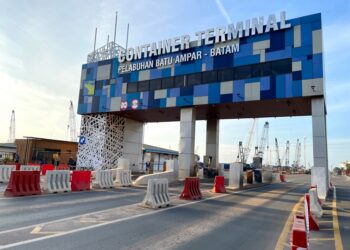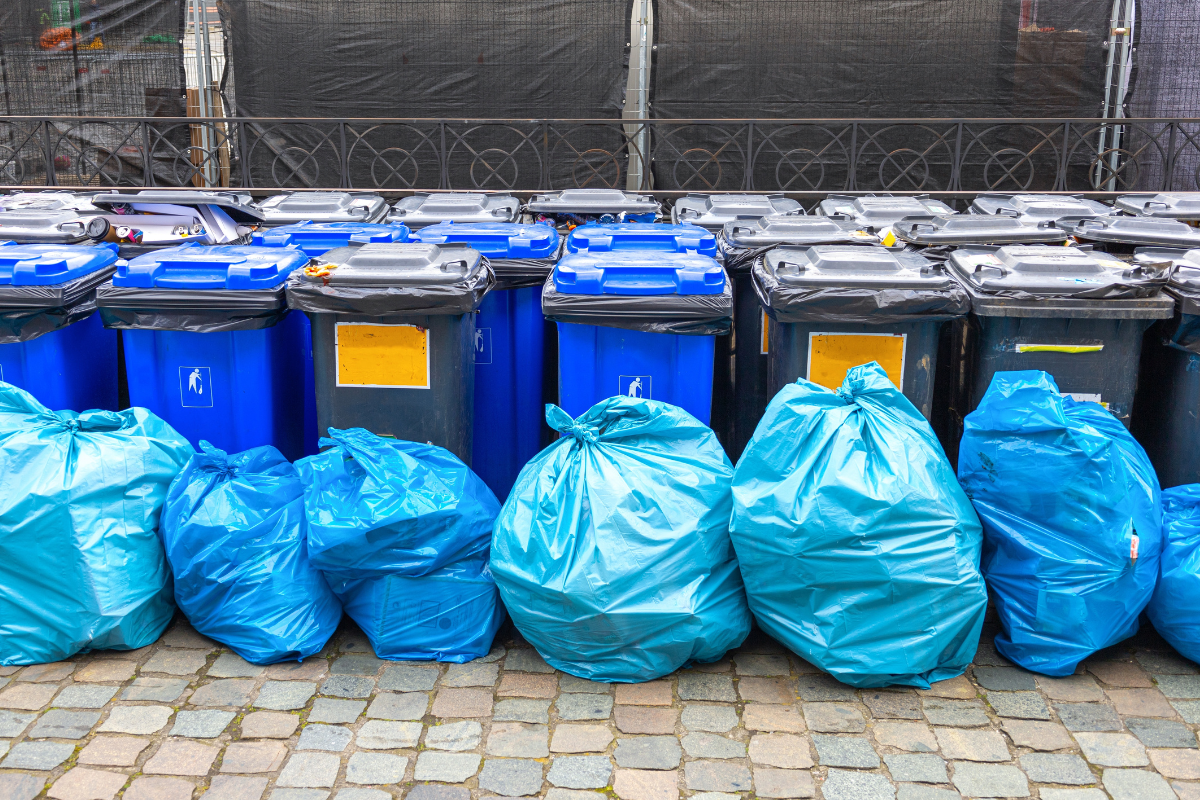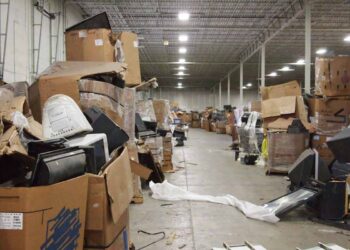Three connected lawsuits between resin supplier ExxonMobil, a handful of nonprofit organizations and California’s attorney general are working their way through the courts. Recently, a Texas city that’s home to an ExxonMobil pyrolysis plant has joined the fray to support the company.
A lawsuit filed against ExxonMobil by the Sierra Club, Surfrider Corporation, Heal The Bay and Baykeeper in September 2024 claimed the company created a public nuisance through its plastic resin contributing to plastic pollution. The lawsuit seeks injunctions against the company and to hold it liable for abatement of plastic pollution, as well as other costs.
The lawsuit was filed the same day as a similar lawsuit against ExxonMobil by California’s attorney general, Rob Bonta, and both were filed in San Francisco County Superior Court. They came on the heels of a multi-year probe by Bonta’s agency into petrochemical companies’ role in generating plastic pollution.
Since both cases’ filing, the legal proceedings have been primarily tied up in arguing about which venue is proper. ExxonMobil successfully argued in October and November to move both the NGO- and attorney general-led cases to federal court. Both the NGOs and Bonta argued to remove the cases back to the state level.
Three months later, after arguments for and against, a federal judge denied the move to bring the NGOs’ action back to the state court, so that case remains at the federal level. But in the same ruling, he approved the attorney general’s move to bring the case back to the state level.
The judge, Richard Seeborg, found that ExxonMobil’s arguments for federal jurisdiction were mostly faulty, with one exception: The company cited a clause that allows for federal jurisdiction if none of the plaintiffs or defendants are from the same state.
The nonprofits had acknowledged this clause applied to this case, but they had asked the federal judge to either abstain from hearing the case, citing past case law establishing a policy of federal courts not intervening in state matters, or to remand both cases back to the state together. Seeborg declined to do so.
The attorney general’s lawsuit is in the process of being moved back to state court, with ExxonMobil still able to appeal.
As for the NGO lawsuit that remains in federal court, most recently, ExxonMobil filed a highly charged motion to dismiss the case altogether, attacking the NGOs’ legal arguments on numerous fronts.
A few highlights from the motion include:
- ExxonMobil argues the idea that consumers purchased certain products because ExxonMobil said they were recyclable, as opposed to the consumer’s own needs or California’s own policies promoting recycling, “is, to put it mildly, a real stretch.” The company argues that “the notion that plastic pollution — a global challenge — was caused by a handful of statements scattered across decades by one raw-material supplier is wholly implausible.”
- ExxonMobil argues that if it is liable for promoting recycling over the years, so should be the state of California and the very NGOs bringing the legal action. ExxonMobil points to a statement by CalRecycle that “maximizing the reuse and recycling of all materials sold in California is vital to the state’s larger effort to build a circular, remanufacturing economy with less pollution.” It points to statements by Baykeeper promoting efforts to “help get kids aware and excited about recycling” and identifying recycling access as a component of Baykeeper’s efforts to mitigate environmental impact from the America’s Cup sailing event in the San Francisco Bay, and a statement from Surfrider that its mission includes “advocating for a reduction of single-use plastics and the recycling of all plastics.”
- While ExxonMobil responds to many of the NGOs’ assertions, the company maintains that they all go back to one principal claim the NGOs are making: that consumers purchased more virgin plastics than they otherwise would have, because of ExxonMobil’s statements about recycling. To this, the company offers a lengthy list of questions: “How much more? Of what specific plastic products? Was the increase sufficient to materially alter pollution levels? How did the plastic that ExxonMobil allegedly promoted end up in the environment? Was it littered in violation of state and local law? Is it the result of deficient municipal landfilling practices? Did it wash ashore from the Pacific Ocean? These and other basic questions about how ExxonMobil’s alleged actions could have plausibly caused any of the harm that plaintiffs allege are entirely unanswered in the complaint.”
Attorneys for the environmental groups have until May 1 to file a response.
Bonta, others seek to be removed from ExxonMobil’s retaliatory lawsuit
In January, as the NGO- and attorney general-led lawsuits were tied up in federal court, ExxonMobil filed its own federal lawsuit against Bonta and the environmental groups, as well as one additional environmental justice nonprofit.
The complaint, lodged in U.S. District Court for the Eastern District of Texas, accused Bonta of an “abuse of the public trust” through his position as a state office holder. It alleged he has “attacked ExxonMobil’s character to raise money for his political campaign.” It also accused an Australian nonprofit of financing the NGO-led lawsuit.
The lawsuit seeks to find Bonta and the environmental groups liable for defamation, disparagement and damages.
It also seeks to hold them liable for losing ExxonMobil business through its chemical recycling operations in Baytown, Texas, where the company operates a pyrolysis facility that had processed 70 million pounds of scrap plastic as of last fall. The company’s promotion of chemical recycling as a solution to plastic pollution was the subject of several attacks in Bonta’s and the NGOs’ lawsuits.
ExxonMobil alleges those lawsuits have led to prospective feedstock supply contracts with municipalities falling through, and caused a “number of entities” to back out of agreements with ExxonMobil related to its chemical recycling plant.
The company also goes further, accusing the defendants of having “harmed the advanced recycling enterprise more broadly by preventing or at least obstructing it from achieving the scale necessary to make the maximum impact on the global pollution crisis and facilitate improvements.”
ExxonMobil seeks “a declaration that advanced recycling is recognized and permitted by law in multiple states, including Texas, and that ExxonMobil is lawfully permitted to engage in and promote advanced recycling at its Texas facility.”
This month, the City of Baytown, Texas, filed to intervene in the complaint on ExxonMobil’s behalf. The city wrote in an April 22 legal filing that the pyrolysis plant gave the city “an innovative solution to recycle its plastic waste that it previously did not have” and that the city is “is making investments and working to build its own plastic recycling programs because of the recycling solution ExxonMobil has provided.”
The city also wrote that “Bonta may have the right to make decisions that impact California, but he does not have the right to act unlawfully or to interfere with ongoing business operations in Texas.”
Bonta on April 24 asked the court to dismiss the lawsuit, arguing that he acted within the scope of his employment in filing his lawsuit, and that both California and Texas law give him immunity to make public statements related to law enforcement issues.
And on April 25, the Australian environmental justice defendant, Intergenerational Environment Justice Fund, asked to be removed from the case. In ExxonMobil’s complaint, it presents a case that the Justice Fund’s involvement is part of a long campaign by its parent organization, a philanthropic group led by billionaire Andrew Forrest, to address the economics of plastic recycling. But it also claims the action is fueled by Forrest’s interest in competing with U.S. oil and gas interests.
Forrest is a majority shareholder and former CEO of metals giant Fortescue, which is a major funder of the philanthropic group and which invested significantly in hydrogen production in recent years but encountered significant roadblocks. The company outlined a vision of selling renewable hydrogen “to the world’s factories and mills, pitting Fortescue against American oil-and-gas companies like ExxonMobil,” according to ExxonMobil’s complaint. Under this reading, ExxonMobil claims the Fortescue-connected nonprofit’s funding of the California lawsuit is a “novel strategy for competing” against U.S. oil producers.
It claims that, “in December 2023, as Forrest’s dream of upending the American oil-and-gas industry teetered on the brink of failure, the IEJF engaged the Cotchett law firm to ‘provide legal services in California lawsuit.'”
In responding, the organization didn’t wade into the lengthy conspiracy arguments. Instead, it simply argued it did not make any of the statements ExxonMobil is describing as defamatory. Instead, it is only accused of providing funding to the law firm that filed the California NGO suit.
“There is nothing that Exxon could allege that would transform that indirect, out-of-state funding into a jurisdictional contact that would permit hauling an Australian organization into a Texas court, or somehow make the Justice Fund liable for the speech of the other defendants,” the organization wrote.





























